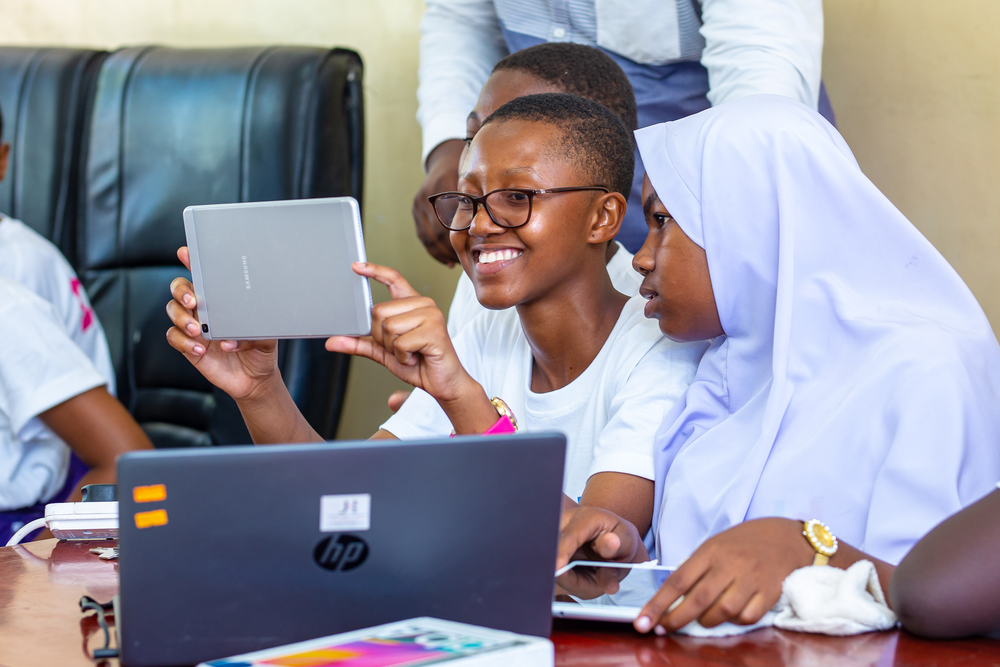
“Partnering in good” to support Ukrainian students

Interviews, News
HP empowers refugee and displaced Ukrainians through access to technology
This year the theme of World Humanitarian Day is “it takes a village”, highlighting that collaboration is essential in times of crisis. Today we want to showcase the role of partnerships in improving access to education and technology. Last month, HP announced a $30 million donation through the Global Business Coalition for Education (GBC-Education) that will provide devices to Ukrainian students, teachers, and healthcare workers in Ukraine and surrounding countries. Microsoft will provide software support for the organizations receiving laptop devices. Michele Malejki, Global Head of Social Impact at HP, answers our questions about the partnership and how it will improve digital equity for Ukrainian refugees.
Why is HP supporting digital equity for Ukrainian students?
We believe that education is a fundamental human right and that technology can be a great equalizer. In 2021, HP committed to accelerate digital equity for 150 million people by 2030. Our focus is on bringing digital equity solutions to underserved communities globally, and centers on education, healthcare, and economic opportunity.
As refugees are displaced for longer and longer periods of time, we continue to acknowledge the critical role that corporate entities can play in ensuring they have the economic and educational tools they need to better integrate into society. HP has a history of supporting refugees and displaced populations all over the world, including Syrian refugees in Lebanon and Jordan, and Afghan families settling in the U.S. We’re now proud to continue this work with GBC-Education and Theirworld to empower over four million Ukrainian educators, students, and healthcare workers.
This donation will support digital equity in many ways. Some devices will be used to help teachers deliver online lessons with the Ukrainian school online curriculum, while others will be used to facilitate teachers’ training. A large proportion will be used to help students and families access online learning programs and support services. It’s important to note that this is not just about providing devices – it’s about bringing holistic solutions, including opportunities for skills training through the HP Foundation’s free skills platform, HP LIFE, as well as solutions from other great ‘partners-in-good’.
Why did HP collaborate with Microsoft?
During a humanitarian crisis, the needs are often bigger than one company can address. Partnerships then become key to providing true relief and ongoing support.
This reflects the spirit of the UN Sustainable Development Goals – without partnership, how can we solve the trillion-dollar digital divide that exists globally today? We can’t. Michele Malejki, Global Head of Social Impact, HP
Sign up to our newsletter:
HP and Microsoft are partners in business and in ‘good’. We are proud to collectively support the Ukrainian people as well as the fantastic organizations serving them, including Junior Achievement, USAID, the Tent Partnership for Refugees, UNICEF, and Osvitoria, to name a few. Of course, none of this would be possible without the support of the Ukrainian authorities. We know the long-term viability of these efforts requires the support of the government and policy makers, and we are thankful to the Ukrainian government for prioritizing digital equity for their people.
What was key to implementing such a large program?
This partnership required an all-hands-on-deck approach: understanding the problem, determining what unique solutions we can offer, and identifying which partners can help scale the effort. We also had to overcome the logistical challenges of shipping tens of thousands of devices, from all over the world, to partners that are poised to accelerate digital equity in a way that is measurable, transparent, and accountable. It’s truly taken a village and we have a strong one here in our partners like GBC-Education, Microsoft, the Ukrainian government, and the recipient organizations.
For programs like this, corporations also need to look beyond the business imperative and tune into the moral one as well. We see this partnership as an opportunity to lead by example and show that refugees and displaced populations are not to be painted as ‘passive victims’ – they are individuals whose lives have been disrupted, but who have skills, dreams, and ambitions that can be put to good use. We hope this work accelerates their achievements and inspires other companies to provide support.
Why did you choose to partner with GBC-Education?
HP has worked with GBC-Education for over 10 years. GBC-Education has experience working with organizations that support education on the ground and understands how companies’ social impact programs operate. In this case, GBC-Education helped identify organizations providing support and services to students and teachers. Together we were able to support thousands of teachers across the U.S. during COVID, and we continue to partner with them in highly complex situations. This reflects our firm belief in creating a holistic ecosystem with partners in the spirit of the SDGs and Goal #17 – Partnership – rather than stopping at one-off device donations.

HP's work with GBC-Education
For the past decade, HP has been a key partner of the Global Business Coalition for Education.
We both believe that education is a fundamental human right and is essential to sustainable development. Since 2015 our teams have worked to support HP’s ambition to deliver better learning outcomes for 100 million people by 2025.
